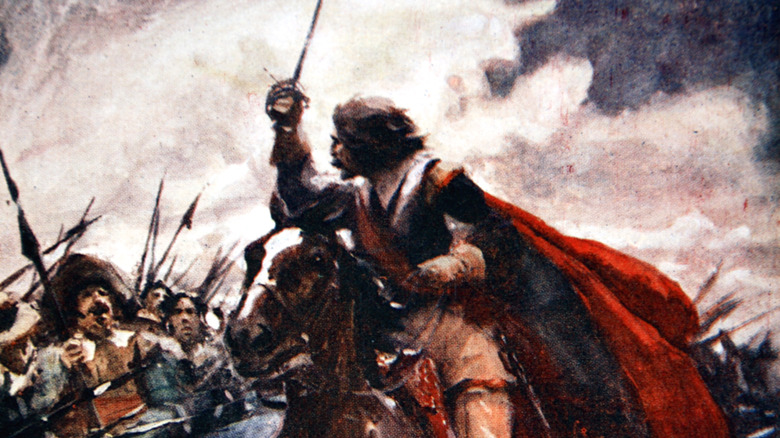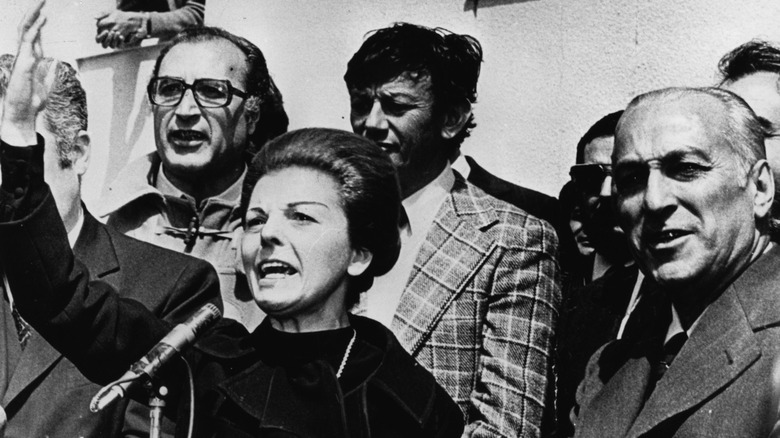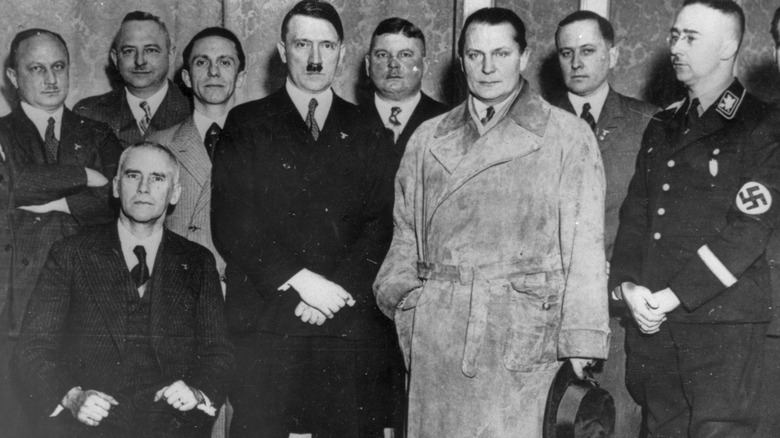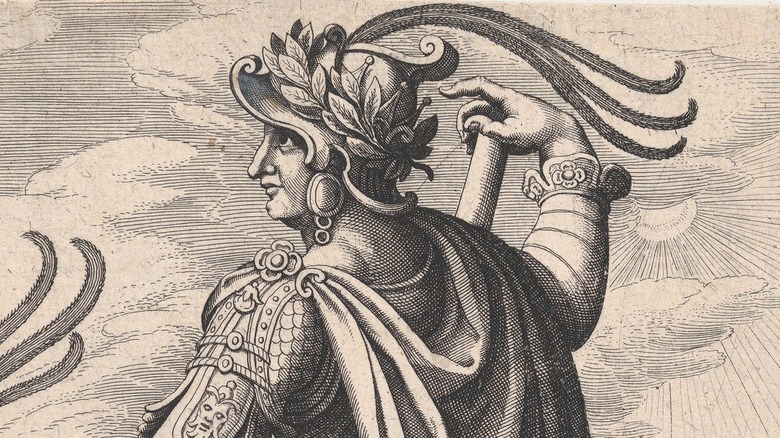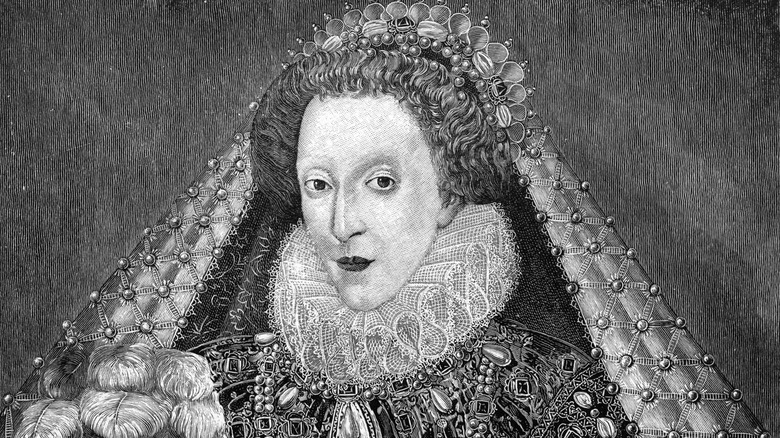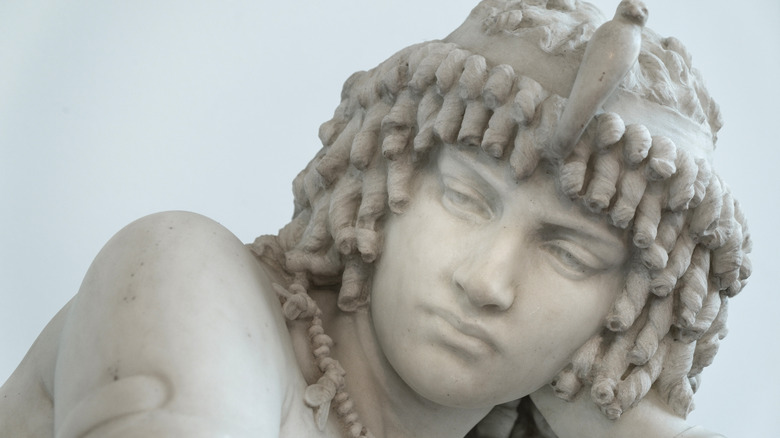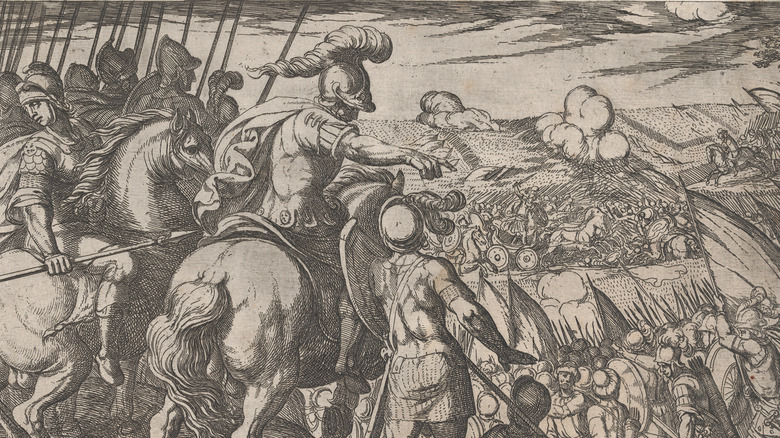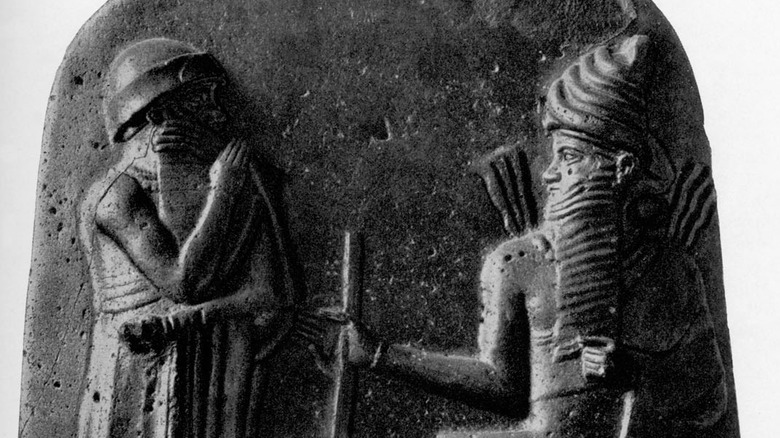Rulers Who Relied On Astrology To Make Decisions
We've all probably indulged in our horoscopes, some to a trivial extent, some to perhaps make major life-changing, if not history-in-the-making decisions. And while you might not think that people who led ancient civilizations or even the modern world would look up to the heavens to be told what to do, you'd be so wrong.
Astrology called the shots for rulers in the Hanging Gardens of Babylon, leaders who listed to disco and wore polyester, and probably heads of government right this very moment. Decisions could be as basic as picking the perfect day for one's inauguration, all the way up to deciding how to go about carrying out a genocide. It's certainly not easy being in charge, and you know what, if a little cosmic intervention is what France needed during the Gulf War, or what Nancy Reagan needed to sleep at night after somebody shot her husband in the chest, so be it.
So, while you might think Mercury being in retrograde isn't that big of a deal, your nation's leader might very well think otherwise. Here are rulers who relied on astrology to make decisions.
General Albrecht Von Wallenstein: A Libra who wasn't always so balanced
General Albrecht Von Wallenstein was in charge of the Catholic forces during the Thirty Years' War, per Encyclopedia. From 1625 to 1632, he ran a super successful campaign against Sweden under Emperor Ferdinand II, and accredited much of it to his astrological chart, according to Britannica. When the 25-year-old general was still up and coming, he went to the renowned scientist and astronomer Johannes Kepler to draw up a horoscope for him in 1608, per History. Kepler's notes from the astrology reading were pretty complimentary of the Libra leader, saying that his "unusual nature will be capable of great deeds" due to Mars having a prominent placement in his birth chart. Wallenstein took the reading to heart, and followed his chart closely as he went on to make incredible progress during the war.
But in 1632, Wallenstein went for another reading the day before the significant Battle of Lutzen, where the astrologer told him things weren't going to go well. Whether the soothsayer got to him, or it really was in the stars, the reading was rightly predicted. Wallenstein endured an embarrassing loss to the Swedes, and shortly after, Britannica says Emperor Ferdinand began stripping the general of his duties. Even Wallenstein's own astrologer at the time, Gian Battista Zeno, became skeptical of the general's reliance on astrology. However, when Wallenstein was executed by Irish forces in 1634 after being found out for staging a coup against Ferdinand, it was in fact the year Kepler had predicted Wallenstein would die when drawing up his charts in the decades prior, per History.
President Isabel Peron was a gal without a clue
Isabel Peron was a pretty unconventional president for Argentina in the 1970's. She came into office only because her husband was Juan Peron, who instituted her as vice president when he was re-elected commander in chief in 1973, per Britannica. When her hubs died nine months after taking office, it was Isabel Peron's time to lead. And it quickly became super evident that she had no clue of what she was doing, according to the Washington Post. So, cue Jose Lopez Rega, aka "The Sorcerer" who filled both the role as Minister of Social Welfare and astrologer. Rega seemed to basically make every decision for Peron, who was completely reliant on both his political expertise and stargazing.
Their partnership didn't last long, since Argentina was already in a period of violent civil unrest, and having a president with zero political background and an unapologetic dependence on horoscopes was merely escalating things. According to Reuters, Rega and Peron were responsible for the conception of the Argentine Anti-communist Alliance, a ring winged death squad that served the purpose to carry out state terrorism. In 1976, Person was arrested and "Argentina's Rasputin," as Rega was affectionately known, fled to Spain. However, if Rega actually came up with astrological charts to justify the heinous crimes he used Peron to carry out, it isn't completely known.
Third Reich fortunetelling
While Adolf Hitler himself wasn't known to interpret the stars, his colleagues Joseph Goebbels, Marshall Heinrich Himmler, and Deputy Fuhrer Rudolf Hess were known to heavily reference astrology to make political decisions. Starting with Joseph Goebbels, the minister of propaganda used a team of astrologers to perpetuate the war message of the Third Reich, according to Vice. And since Germans were already pretty big believers in astrology, this worked splendidly for Goebbels to undermine the enemy. But to control the narrative in typical Nazi fashion, citizens were prohibited from interpreting and making their own astrological predictions, according to HistoryNet.
For Heinrich Himmler, his team of astrologers were used to help locate Benito Mussolini when he went missing, according to HistoryNet. When the Italian dictator was recovered, Himmler gave much of the credit to the fortunetellers rather than whomever may have helped break radio codes to find him.
As for Rudolf Hess, the deputy made a pretty daring decision in 1941 that was off of a planetary positioning between Uranus and Neptune. His astrologers insulated that it was an advantageous time to make peace talks with the British, and encouraged him to do so, according to History. But, his plane crash landed in Scotland on the way, and he was immediately put in prison after officials discovered he didn't have any authorization to be gallivanting off to Britain, per HistoryNet. This incident really, really upset Hitler, and by 1944 to show that he was completely over the influence of the stars on his men, he sent the country's astrologers to the concentration camps and made sure to burn their books as well.
Tiberius Caesar was an emperor with stars in his eyes
When it came to decision-making, Tiberius Caesar was completely ruled by his birth chart. But this was totally expected if not obligatory at the time in Ancient Rome, per Swinburne University. He actually took his chart so seriously, that he would toss astrologers off a cliff if they didn't pass his tests to prove their knowledge, according to History. Or it could have just been an excuse to throw some guys off cliffs to have a little fun with all that power, who knows, Tiberius was known to be a little mischievously sadistic like that, according to "Thrasyllus in Tacitus."
Tiberius' eventual go-to star man was Thrasyllus, an astrologer who managed to pass Caesar's test by predicting that the emperor was perhaps going to throw him into the void. Thrasyllus went on to have a pretty great track record for his soothsaying, including predicting Tiberius' somewhat unexpected ascension to the throne due to being a step-son to the previous ruler Caesar Augustus, according to "Thrasyllus in Tacitus." The two spent so much time together, that Tiberius became well versed in astrology as well and would bat ideas back and forth with Thrasyllus over politicians that were possibly trying to bamboozle him with money or influence, according to "Astrology in Roman Law and Politics."
The Reagans kept an astrological schedule
Both President Ronald Reagan and First Lady Nancy Reagan were openly into astrology during their time in the White House. And despite Ronald stating ”No policy or decision in my mind has ever been influenced by astrology,” he was pretty good friends with the celebrity astrology Carroll Righter, whom he consulted with while he was governor of California, according to the New York Times. At that time, he was known to have planned certain events according to planetary configurations, like his inauguration when he became governor.
Nancy was much more open about her interest and use of astrology, according to the Associated Press. Supposedly, when her husband survived his assassination attempt in 1981, she had heard from an astrologer shortly before the incident that something ominous was going to occur on that day. According to the White House spokesman at the time (via the New York Times), Nancy followed his charts closely in case they'd provide clues of it happening again. Understandably, she was shaken up at the possibility of losing her husband of nearly 30 years at the time, and she was in charge of his schedule concerning public appearances and meetings with world leaders thereafter.
Elizabeth I kind of owed her life to her astrologer
Queen Elizabeth I was widely known to consult her astrologer, John Dee, on all of her decisions, even before she was queen, per History. When ol' Lizzy faced the possibility of being executed (since she was next in line to rule and her sister Queen Mary I wasn't her biggest fan), Elizabeth went to Dee for a reading, desperate to find out if she was truly fated to lose her head. When Dee ran up the stats of Elizabeth's birth chart, it turned out that she wasn't going to face the chopping block at all. Instead, it was Mary who would die suddenly, leaving the throne wide open for Elizabeth. Since Dee's reading was so accurate (and undeniably soothing for that matter) he solidified his spot as Elizabeth's top advisor for the rest of her reign.
It was common during that era for royals, or even commoners, to use astrology like a science. It was considered just as useful for politics as it was for medicine— ever heard of iatromathematics? That's what they called medical astrology when it was a thing, per Encyclopedia. And John Dee was a special guy, or at least he thought so, as he claimed to speak to angels and even wrote their language for them, per Smithsonian. But aside from being pretty hot the occult, he was very well respected for his swath of knowledge on various subjects including legit sciences. Dee even contributed to the groundwork for Galileo's first telescope. So why wouldn't Elizabeth I use him as her top advisor? Even if he did try to communicate with the dead on occasion.
Cleopatra was all about her inner Isis
The Queen of Egypt was known to have multiple astrologers, and used them to update her on international happenings, including what was going on over in Rome, according to "Cleopatra the Great." She was born during the era of Ptolemy's work, a mathematician and astronomer who contributed some of the foundation to planetary configurations and determining the distinction between Egyptian zodiac signs, per Tour Egypt. And while it's probably impossible to find the juicy details of Cleopatra's conversations with astrologers from over 2,000 years ago, historians can gather that she was at least astutely interested in the happenings of the stars, especially since it was still a prominent science of the day.
When Cleopatra took the throne, she commissioned a mural of the zodiac to be painted on the ceiling of the Dendera Temple, per "The Eclipse of Queen Cleopatra and Dendera Zodiac." According to History, the last pharaoh seemed to identify with the goddess Isis— which is a zodiac sign in ancient Egyptian astrology. Per Astrology of the Ancients, Isis is all around a great female leader who knows how to have a good time, not take life too seriously but also fill the role as a supreme protector. Isis also means throne, so, that's pretty self-explanatory for Cleopatra's connection there.
Indira Gandhi was a woman after predictions
India's Prime Minister Indira Gandhi was known to refer to astrologers for major decisions, both openly and disputedly. Astrology is still commonly used in India, although Indira did reject any belief in horoscopes or gods for that matter earlier in her career, according to "Astrology's Influence in Three Modern Governments." But when astrologers rightly predicted her son's death in 1980, Indira became more reliant on what the stars may have had to say, records "Indira Gandhi, Her Road to Power." According to "Astrology's Influence in Three Modern Governments," various sources in Indira's circle said she even held off her swearing in ceremony to a more advantageous date on January 14, or filing her nomination papers at exactly 12:30pm on October 6 because it was also recommended by astrologers.
So it's no wonder that in 1981 when an astrologer from a small Hindu newspaper predicted that the prime minister would be assassinated, an intelligence agency immediately took him in for questioning, per the Washington Post. Even at the end of her life, astrologers were ever present in their predictions and were strangely accurate, as Indira Gandhi was assassinated by her own bodyguards in 1984.
Alexander the Great: the guy who kind of started it all
If you hate hearing your friends talk about their personal horoscope for the day, be aware that Alexander the Great is kind of responsible for kickstarting the Western version of astrology that is so widely known today. After Alexander conquered Babylon in 331 BCE, he shared the East's practice of astrology with Greek mathematics, according to History. By combining this information from the two well-established civilizations, it eventually evolved into the side of astronomy we know today as astrology.
Originally, Babylonians used the night sky to make predictions for the empire and the king, not on a person-to-person basis according to Swinburne University. But as Alexander continued to further Macedonia's reign throughout the East into Persia, the Greeks began to make their own astronomical prediction that the conqueror would fall in Babylon. He thought it was bologna, but they were right, which is pretty impressive since that was a fairly new concept for the Mediterranean.
Francois Mitterrand watched the stars during the Gulf War
Francois Mitterrand, the late president of France, used a couple of astrologers to help him make decisions. This wasn't too much of a surprise to those in government, since previous president Charles De Gaulle also used astrologers to help him out in the 1960s, per News24. According to the Guardian, while Mitterrand was in office in the early 1990s, he referred to Élizabeth Teissier's advice on a regular basis for major political affairs, particularly for the Gulf War. Before a major meeting about France's undesired involvement in the conflict, Teissier called the president to let him know that the day of this meeting would go well for him.
As it turned out, Mitterrand reported back that Iraq's foreign minister was a lot chattier that day during negotiations, which he said was a pretty promising sign for the future of France's unwanted prolonged participation. He even asked her once when he needed to give a speech about the war's progress, remembering she had explained to him there were in fact more advantageous days to give them, to which she obliged with "Sunday, Monday, or Tuesday."
King Hammurabi was a man of many rules, straight from the sun
Since Babylon is considered the civilization in which astrology originated nearly 5,000 years ago, we could modestly deduce that it's big bad leader, King Hammurabi, must have followed the movements of the cosmos. His reign was long before Alexander the Great came along to shake things up for the Babylonians' planetary practices, and is well known for his very original and extensively brutal list of rules known as the Code of Hammurabi. But between approximately 1792 to 1750 BCE, the king's influence on astrology showed up in the gods that this thriving culture established during that time.
The oldest astrological texts known today, which laid the foundation for Babylon's religious belief in the stars, were from the days of Hammurabi's rule, according to "Hepatoscopy and Astrology in Babylonia and Assyria." For Babylonians, the planets themselves were gods, and these deities were believed to send direct messages to the king, per Kepler College. A Babylonian legend says that King Hammurabi received his code of laws directly from the sun god Shamash, the ruler of justice, per Britannica. Did Hammurabi journal about such an interaction himself? Unfortunately, no. But if you're looking for an explanation for where rules on "an eye for an eye" or impaling scheming lovers came from, you certainly shouldn't rule out the planets having something to do with them.

